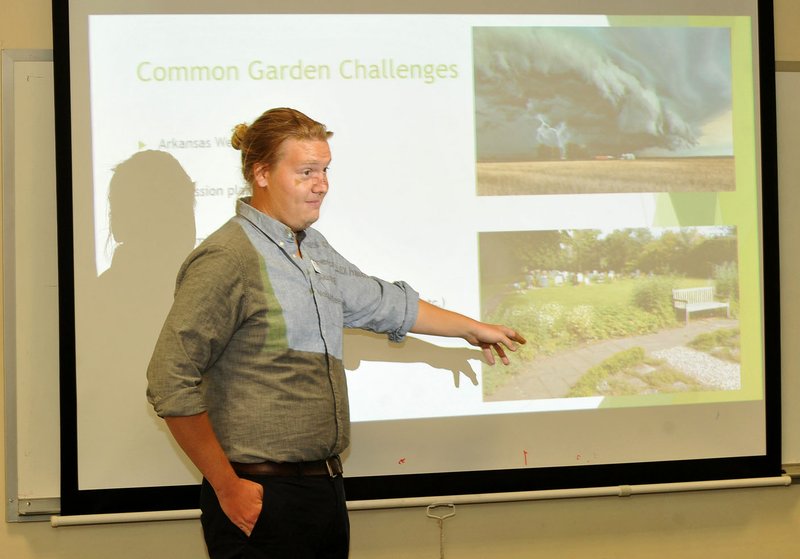SPRINGDALE -- Northwest Arkansas' dozens of food pantries and charities must band together to tackle hunger and food insecurity affecting tens of thousands of people even in this prosperous corner of the state, the head of the region's largest food bank said Tuesday.
More than 100 representatives of hunger-fighting groups gathered Tuesday in Springdale's Jones Center for the first Health and Hunger in Northwest Arkansas conference. The group delved into the interconnections between hunger and a slew of other health concerns. The meeting also was meant to build connections among the mosaic of church groups, town pantries and other agencies that work to address those concerns, said Kent Eikenberry, Northwest Arkansas Food Bank chief executive officer.
Food insecurity in Arkansas
Hundreds of thousands of Arkansans struggle to get enough healthful food every day, known as food insecurity. Feeding America tracks the percentage of food-insecure people at the county level.
Arkansas: 19.1, or almost 600,000 people
Benton County: 12.9, or more than 32,000
Carroll County: 14.6, or more than 4,000
Madison County: 15.7, or about 2,500
Washington County: 16.4, or about 37,000
Source: Feeding America
"It's hard to believe that where we live, nearly 130,000 of our friends and neighbors are hunger-challenged," he told the group at the conference's start. "Working together as a group, we can share that message and spread that message better," he added later.
The food bank provides food to more than 180 pantries in Benton, Carroll, Madison and Washington counties and hosted the conference with the University of Arkansas for Medical Sciences and Feed Communities, a Fayetteville charity.
One in five Arkansans can't afford enough food that's also nutritionally adequate, don't have easy access to that food because of where they live or otherwise can't count on their next meal, said Pearl McElfish, director of the university's Office of Community Health and Research. That number is the second-highest in the country and includes one-fourth of the state's children, she added.
Northwest Arkansas' hunger is slightly lower, but roughly one in seven remain hungry in Washington and Benton counties despite steadily increasing average income and quality of life, according to Feeding America's "Map the Meal Gap" online database. The nationwide hunger organization includes the Northwest Arkansas Food Bank.
The issue is intertwined with obesity, heart disease and other maladies, McElfish and others said. People with low-incomes might opt for cheaper foods loaded with fats, salt and sugar, which can spark diabetes and high blood pressure. High medical costs in turn can force people to choose between food and medications for those problems.
Hungry kids can perform poorly in school, leading to lower incomes in their future, and so on.
"Yes, it's a 'choice' to make that food option, but we all know it's not a happy choice or an easy choice," said Jessica Hager, manager of community health and nutrition for Feeding America. The group helps about 46 million Americans a year, a record high that Hager said has held steady for several years.
Groups can head off the food-insecurity cycle and encourage people to choose better food in their pantries in several inexpensive ways, such as quick rundowns of recipes and other education, Hager told the conference. Even arranging produce to be more appealing and other subconscious "nudges" have boosted how much people take with them, she said.
Providers also must take cultural considerations into account with the area's Hispanic and Marshallese populations, several speakers said. Both groups often avoid formal health care unless absolutely necessary and are accustomed to fried or fatty foods.
Wanna Bing, a Marshallese research coordinator with the medical sciences university, suggested groups provide more healthful brown rice in place of the white rice many Marshallese eat, for example. Carolina Vargas, a university project coordinator, urged pantries to give recipes for vegetables many Hispanic families might be unfamiliar with.
Agencies forged connections through their discussions and found help with grant-writing and other needs.
Sandra Hutchens, volunteer director with the Second Street Pantry at Bentonville's First United Methodist Church, said the group helped 17,000 people with food and other bills last year with purely volunteer labor. The group's looking to expand and wants advice on how to get grants and meet other needs, she said.
Eikenberry told her his group would be happy to help.
"That is huge, knowing we have a support network -- not just for coming and getting food," Hutchens said with a smile.
NW News on 07/20/2016
